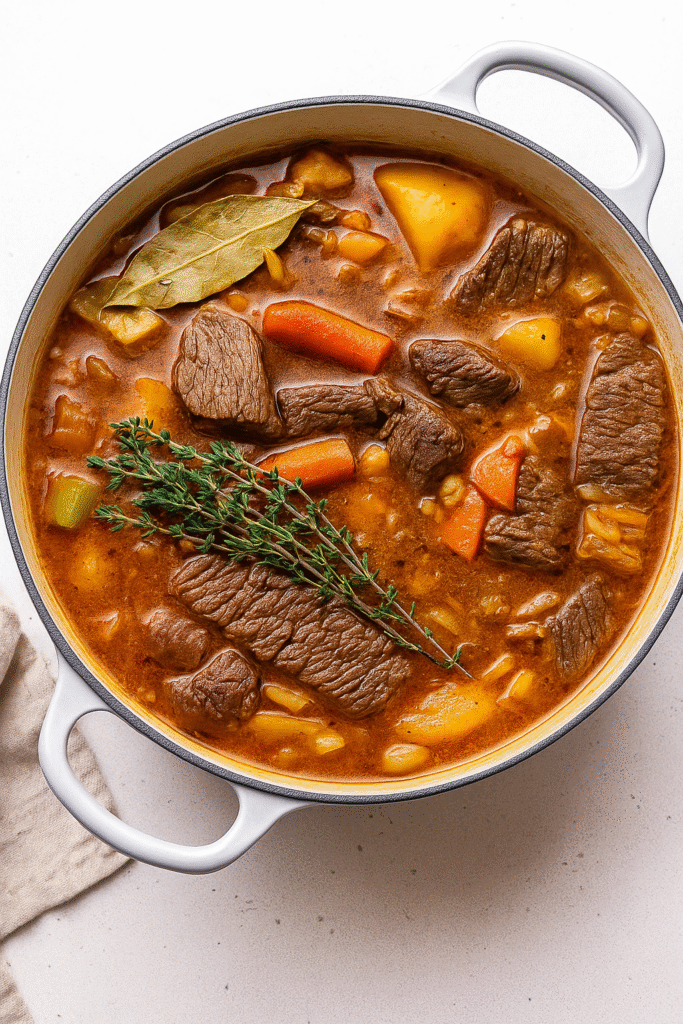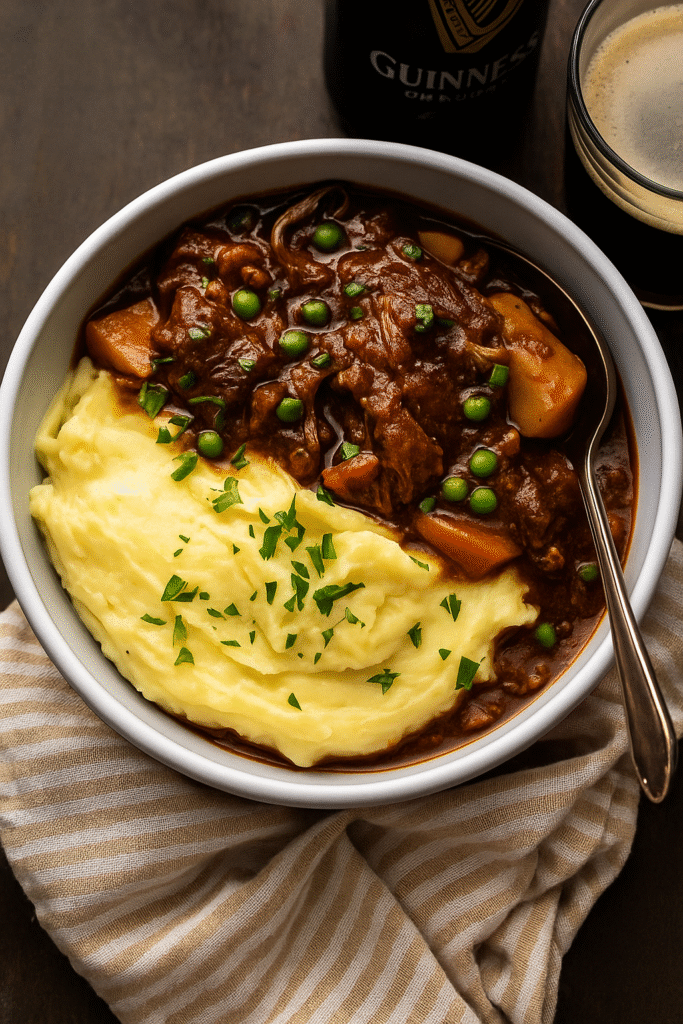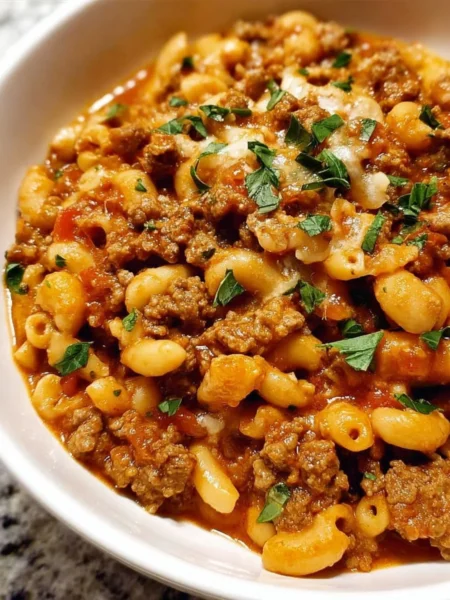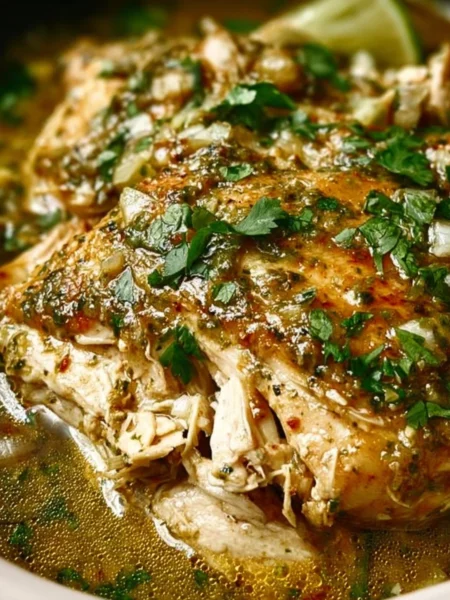Imagine a dish that wraps you in the warmth of its hearty embrace, a bowl of comfort that transcends seasons and settings. This Guinness Beef & Potato Stew is a culinary journey that brings together rich, robust flavors with the rustic simplicity of a time-honored classic. It’s a dish that whispers tales of its Irish origins while offering a universal appeal through its comforting aromas and deep, savory notes.
The Aroma of Heritage
When you think of a stew, what comes to mind? For many, it’s the sound of a gentle simmer echoing through a cozy kitchen, the air thick with the aroma of slow-cooked goodness. This stew is no different, though it carries with it the legacy of its Irish roots, where Guinness stout imparts a unique depth to its flavor profile. Picture this: a bustling Irish pub, the clinking of glasses, and laughter intermingled with the rich scent of stewing beef and potatoes. This stew hails from such traditions, where hearty meals are the heartbeats of social gatherings.
A Taste of Ireland
Guinness, often referred to as the “Black Stuff,” is not just a drink but a symbol of Irish culture. This stout beer, with its deep, malty richness, is the soul of the stew. It’s not merely an ingredient; it’s a storyteller. As it mingles with tender chunks of beef, it infuses the dish with a dark, caramel-like sweetness that contrasts beautifully with the earthiness of potatoes. In Ireland, stews like this one are not just meals; they are a means of hospitality, a way to warm both body and spirit.
The Heartfelt Ingredients
The ingredients in this stew are like characters in a beloved novel, each playing a vital role in the unfolding drama of flavors. The beef, chosen for its marbling and tenderness, is the protagonist. It transforms over hours of slow cooking, becoming melt-in-your-mouth tender, its juices mingling with the stout to create a deeply savory broth. Then there are the potatoes, humble yet essential, absorbing the rich flavors while adding a comforting texture.
Guinness: The Magic Elixir
The true magic of this stew lies in its use of Guinness. This iconic stout, with its dark, velvety texture, is more than just a cooking liquid. It acts as both a seasoning and a tenderizer, its bitterness balancing the sweetness of the vegetables and the richness of the meat. As the stew simmers gently, the alcohol evaporates, leaving behind a depth of flavor that is both complex and comforting. It’s like crafting a symphony, where each note plays its part in harmony.
Vegetables: The Supporting Cast
Alongside the beef and beer, a medley of root vegetables rounds out the stew. Carrots and onions bring a natural sweetness that complements the stout’s bitterness, while celery adds a subtle herbal note. These ingredients not only add flavor but also color and texture, making the stew as pleasing to the eye as it is to the palate. Imagine the vibrant hues of orange and green, the way they stand out against the dark, rich broth—it’s a visual feast before you’ve even taken a bite.
The Craft of Cooking

Cooking this stew is an art form, a dance of patience and timing. It begins with the searing of beef, a crucial step that locks in flavor and creates a caramelized crust that will enrich the stew. Imagine the sizzle as the beef hits the pan, the aroma that wafts up, promising the deliciousness to come. Once the beef is browned, the vegetables get their turn, sautéed until they begin to soften, releasing their fragrant sweetness.
The Slow Simmer
The true magic happens during the slow simmer. This is where the stew finds its soul, where the flavors meld and deepen. It’s a time of anticipation, as the kitchen fills with the heady scent of simmering stout and spices. This is not a dish to rush; it rewards patience and care. As the stew bubbles gently, the beef becomes tender, the potatoes creamy, and everything is infused with the rich, complex flavors of the ingredients.
Cultural Significance
The Guinness Beef & Potato Stew is more than just a meal; it’s a cultural artifact. In Ireland, stews are a staple, a way to nourish and connect with others. This particular stew, with its use of Guinness, reflects the ingenuity of Irish cooking, where simple ingredients are transformed into something extraordinary. It’s a dish that tells a story of resilience and resourcefulness, of making the most of what you have.
A Tradition of Hospitality
In Irish culture, food is often a medium of hospitality, a way to welcome and show care. Serving a bowl of this stew is like offering a warm hug, an invitation to sit, relax, and enjoy the company. It’s a reminder of the importance of gathering, of sharing not just food but stories and laughter. Imagine a table surrounded by friends and family, each with a steaming bowl of stew, the clinking of spoons and murmurs of appreciation filling the air.
Why This Stew is Special
What sets this stew apart is its balance of flavors and textures, its ability to comfort and satisfy. It’s a dish that invites you to slow down, to savor each bite. The rich broth, the tender beef, the creamy potatoes—all come together in a symphony of taste that is both simple and profound. It’s a dish that allows you to connect with the past, while still creating new memories.
A Bowl of Comfort
There’s something inherently comforting about a stew. It’s a dish that speaks to our need for warmth and nourishment, especially on cold days. This Guinness Beef & Potato Stew is like a cozy blanket, wrapping you in its deliciousness. It’s the kind of meal that brings people together, that makes a house feel like a home. Whether you’re serving it at a family gathering or enjoying it solo with a good book, it’s sure to provide comfort and satisfaction.
Conclusion: An Invitation to Share
In conclusion, the Guinness Beef & Potato Stew is not just a recipe; it’s an experience, a journey through flavors and traditions. It’s a dish that celebrates the beauty of simple, quality ingredients, and the joy of sharing a meal with others. Whether you’re an experienced cook or just starting out, this stew offers an opportunity to connect with a rich culinary heritage and create something truly special.
As you embark on this cooking adventure, remember that it’s not about perfection, but about enjoyment and learning. Don’t worry if your first attempt isn’t flawless—each time you make this stew, you’ll discover new nuances and flavors. And once you’ve tasted it, you’ll understand why it’s a dish worth sharing.
I’d love to hear about your experiences with this recipe! Did you add your own twist or stick to the classic version? Share your kitchen stories and photos with me. Let’s celebrate the joy of cooking and the warmth of bringing people together over a delicious meal.
Use Your Leftovers
Reduce food waste by making these recipes with your leftover ingredients:

Guinness Beef & Potato Stew
Description
This Guinness Beef & Potato Stew is a robust blend of tender beef, creamy potatoes, and flavorful Guinness, creating a dish that's both satisfying and comforting.
Ingredients
Main Ingredients
Instructions
Preparing the Ingredients
-
Chop and Prepare Vegetables
Begin by chopping the onions, carrots, and celery into bite-sized pieces. Peel and dice the potatoes into medium-sized chunks.Keep the vegetables uniform in size to ensure even cooking. -
Season the Beef
Cut the beef chuck into 1-inch cubes. Season generously with salt and pepper to taste.Allow the beef to sit for a few minutes to absorb the seasoning.
Browning the Beef
-
Sear the Beef
Heat a large pot or Dutch oven over medium-high heat and add a splash of oil. Sear the beef cubes in batches, ensuring they are browned on all sides. Remove and set aside.Avoid overcrowding the pot to ensure a nice sear on the beef.
Building the Stew
-
Cook the Aromatics
In the same pot, add a bit more oil if needed. Sauté the onions, carrots, and celery until they are softened and aromatic.Use the browned bits at the bottom of the pot to add flavor to the vegetables. -
Deglaze with Guinness
Pour in the Guinness beer, scraping the bottom of the pot with a wooden spoon to release any flavorful bits. Allow it to simmer for a couple of minutes.This step adds depth to the stew while helping to tenderize the beef.
Simmering the Stew
-
Combine Ingredients
Return the seared beef to the pot along with the diced potatoes. Add beef broth and a bay leaf, stirring to combine.Ensure the liquid covers the beef and vegetables. -
Simmer Gently
Bring the stew to a gentle simmer. Cover the pot and reduce the heat to low. Let it cook for about 2 hours, or until the beef is tender.Stir occasionally and check the liquid level, adding more broth if necessary.
Finishing Touches
-
Adjust Seasoning
Taste the stew and adjust the seasoning with salt and pepper as needed.For a richer flavor, add a splash of Worcestershire sauce or a pinch of thyme. -
Serve the Stew
Ladle the stew into bowls and garnish with chopped parsley for a fresh touch.Enjoy with crusty bread or a side of green beans for a complete meal.
Note
For the best flavor, use a good quality beef chuck roast, trimmed and cubed into bite-sized pieces. The key to achieving a rich and thick stew is to coat the beef in flour before browning; this will also help to seal in the juices. When searing the beef, ensure the pan is hot enough to achieve a deep caramelization, which contributes to the stew's savory depth. Choose a stout like Guinness for its robust flavor that complements the beef and adds a slight bitterness that balances the stew's richness. Allow the stew to simmer gently for at least two hours, or until the beef is fork-tender. During this time, the flavors meld together beautifully, creating a comforting and hearty dish. For the potatoes, opt for waxy varieties, such as Yukon Gold or red potatoes, which hold their shape well during cooking. If you prefer a thicker consistency, mash a few pieces of potato against the side of the pot. Add vegetables like carrots and onions early on for sweetness. If desired, introduce peas or chopped greens like kale or spinach towards the end for a fresh touch. Season the stew generously with salt and pepper, tasting and adjusting as it cooks. A splash of Worcestershire sauce can provide an added depth of flavor. Serve with crusty bread or over buttered noodles for a complete meal. The stew tastes even better the next day, as the flavors continue to develop.








